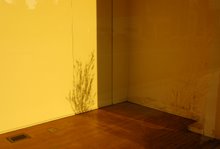 Deli Mart, Radford, VA
Deli Mart, Radford, VAOn the last day of exam week here at RU (move out day), I offer you the opening paragraphs of one of my favorite novels, Don Delillo's White Noise. Substitute "removing objects" with "packing objects in" and station wagons with snappy little suvs like honda crvs and bmw X5s and the picture fits. If you haven't read White Noise, I highly recommend it. The first 2/3 is great. I don't think Delillo handles the final 1/3 as well, but the idea behind it--that our excessive consumption is linked to a fear of death (I should say one of the ideas; there is, of course, much more to it than this)--is interesting and seems undeniable. What were we immediately asked to do after 9/11 to restore a partial sense of order and well being? Go shopping, of course.
The station wagons arrived at noon, a long shining line that coursed through the west campus. In single file they eased around the orange I-beam sculpture and moved toward the dormitories. The roofs of the station wagons were loaded down with carefully secured suitcases full of light and heavy clothing; with boxes of blankets, boots and shoes, stationery and books, sheets, pillows, quilts; with rolled up rugs and sleeping bags; with bicycles, skis, rucksacks, English and Western saddles, inflated rafts. As cars slowed to a crawl and stopped, students sprang out and raced to the rear doors to begin removing the objects inside; the stereo sets, radios, personal computers; small refrigerators and table ranges; the cartons of phonograph records and cassettes; the hairdryers and styling irons; the tennis rackets, soccer balls, hockey and lacrosse sticks, bows and arrows; the controlled substances, the birth control pills and devices; the junk food still in shopping bags—onion and garlic chips, nacho thins, peanut crème patties, Waffelos and Kabooms, fruit chews and toffee popcorn; the Dum Dum pops, the Mystic mints.
I’ve witnessed this spectacle every September for twenty-one years. It is a brilliant event, invariably. The students greet each other with comic cries and gestures of sodden collapse. Their summer has been bloated with criminal pleasures, as always. The parents stand sun-dazed near their automobiles, seeing images of themselves in every direction. The conscientious suntans. The well-made faces and wry looks. They feel a sense of renewal, of communal recognition. The women crisp and alert, in diet trim, knowing people’s names. Their husbands content to measure out the time, distant but ungrudging, accomplished in parenthood, something about them suggesting massive insurance coverage. This assembly of station wagons, as much as anything they might do in the course of the year, more than formal liturgies or laws, tells the parents they are a collection of the like-minded and the spiritually akin, a people, a nation.

No comments:
Post a Comment